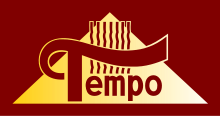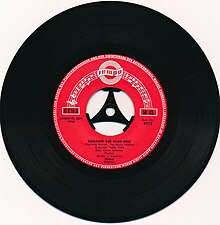Tempo (label)
Tempo was a German record label from the 1930s to the 1970s.
Established as a "cheap label"
In 1931 Otto Stahmann founded the recording company Schallplattenindustrie Otto Stahmann - Brillant AG in Berlin-Wilmersdorf . The focus was on the production of records with a popular repertoire at a reasonable price, intended for sale in department stores and unit stores . The company developed into a quasi-monopoly in the cheap sector in the 1930s . The records were sold under the labels Brillant-Special , Record and Grohag , among others . Just a few years later, Stahmann was able to build a larger press shop in Potsdam-Babelsberg . The brand change from Brillant-Special to Tempo was completed in mid-1937 . At the same time, the company was renamed Tempo Schallplatten GmbH Otto Stahmann .
Apart from some American matrices from the Clangor label , as well as Hungarian recordings by Radiola , Tempo mainly published in-house productions even before the war. Although Tempo was considered a cheap department store brand, the artistic and technical quality of the records was remarkably high. During the Second World War, Tempo published popular dance music from well-known orchestras by Bernard Etté , Kurt Widmann and Horst Winter, among others .
post war period
After the war, the pressing plant in Babelsberg, which had hardly been destroyed, became the property of VEB Lied der Zeit . From then on, records from the Tempo brand were produced by the newly founded record factory Special-Record GmbH in Großhesselohe near Munich. A completely new production started here, but some old recordings were released on the Special Record and Union Record labels . Several takeovers of Belgian matrices from the Sphinx and Ronnex brands followed . In return, Tempo recordings appeared on cheap labels in Belgium and the Netherlands.
1950s
The concept of the pre-war period could be successfully continued during the great time of the hit in the 1950s. Almost all of the hits at that time were re-recorded at Tempo with their own contract musicians. Due to the still low sales price, the Tempo brand singles and EPs were an integral part of everyday German culture during the economic miracle . Some of the musicians hired by the cheap label were even able to achieve a certain popularity and continue their careers with larger record companies. The best-known performers, who often worked under pseudonyms at Tempo, included Fred Bertelmann , Rainer Bertram , Peggy Brown , Christian Bruhn , Fancy (as Tess Teiges ), Gerd Fitz , Tommy Kent (as Tommy Shane ), Charlotte Marian and Teddy Parker ( as Bernd Anderson , Jimmy Fields , Bobby Stern etc.). The recordings by the humorists Herbert Hisel and Kathi Prechtl also met with great demand from the audience.
1960s until today
The advent of beat music reduced the sales of the cheap label considerably from the mid-1960s. Production stopped in 1979. The licenses for the recordings were held by Heloton Multimedia based in Prüm until around 2000 , whose owner Lorenz Hefele was the last managing director of Tempo from 1972. Today Hefele operates under the name of Heloton Musikproduktion Kaisersesch .
Artists and pseudonyms (selection)
| Artist (alphabetical) | Pseudonyms for "Tempo" |
| Erika Berg | |
| Fred Bertelmann | |
| Rainer Bertram | |
| Peggy Brown | Margit Schumann |
| Christian Bruhn | |
| Fancy | Tess doughs |
| Gerd Fitz | Fitzett (with Molly & Walter Fitz) |
| Frank Forster | |
| Harry Graf | |
| Tommy Kent | Tommy Shane |
| Charlotte Marian | |
| Teddy Parker | Claus Herwig, Klaus Herwig, Ralph Herwig, Jimmy Fields, Bobby Stern, Bernd Anderson, Bobby Stern, Johnny |
| Udo Spitz | |
| Jean Thomé | Jean "Fats" Thomé |
Orchestra at "Tempo" (selection)
- Kurt Graunke Orchestra
- Orchestra Raimund Rosenberger
- Ernst Jäger (musician, 1913) with his orchestra
- Lutz Dietmar with his orchestra
- Josef Niessen with his Nuremberg Dance Orchestra
- Steff Lindemann with his orchestra
- Waldtruderinger brass musicians
- Great Viennese Waltz Orchestra
- Regimental band of the former KuK infantry regiment Hoch- u. German champion No. 4
Individual evidence
- ↑ Reinhard Otto: The early record production in Babelsberg and Nowawes. Lecture at the annual meeting of the IASA country group Germany / German-speaking Switzerland, Potsdam, October 25, 2003 (PDF; 48 kB)


